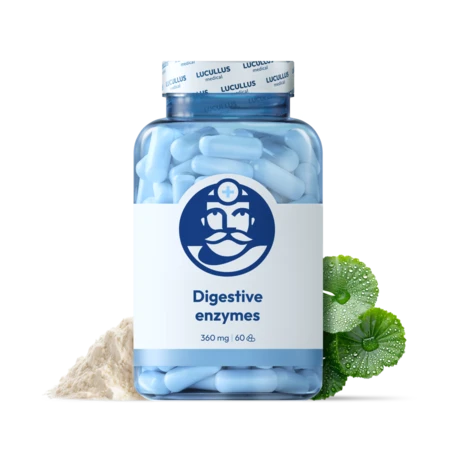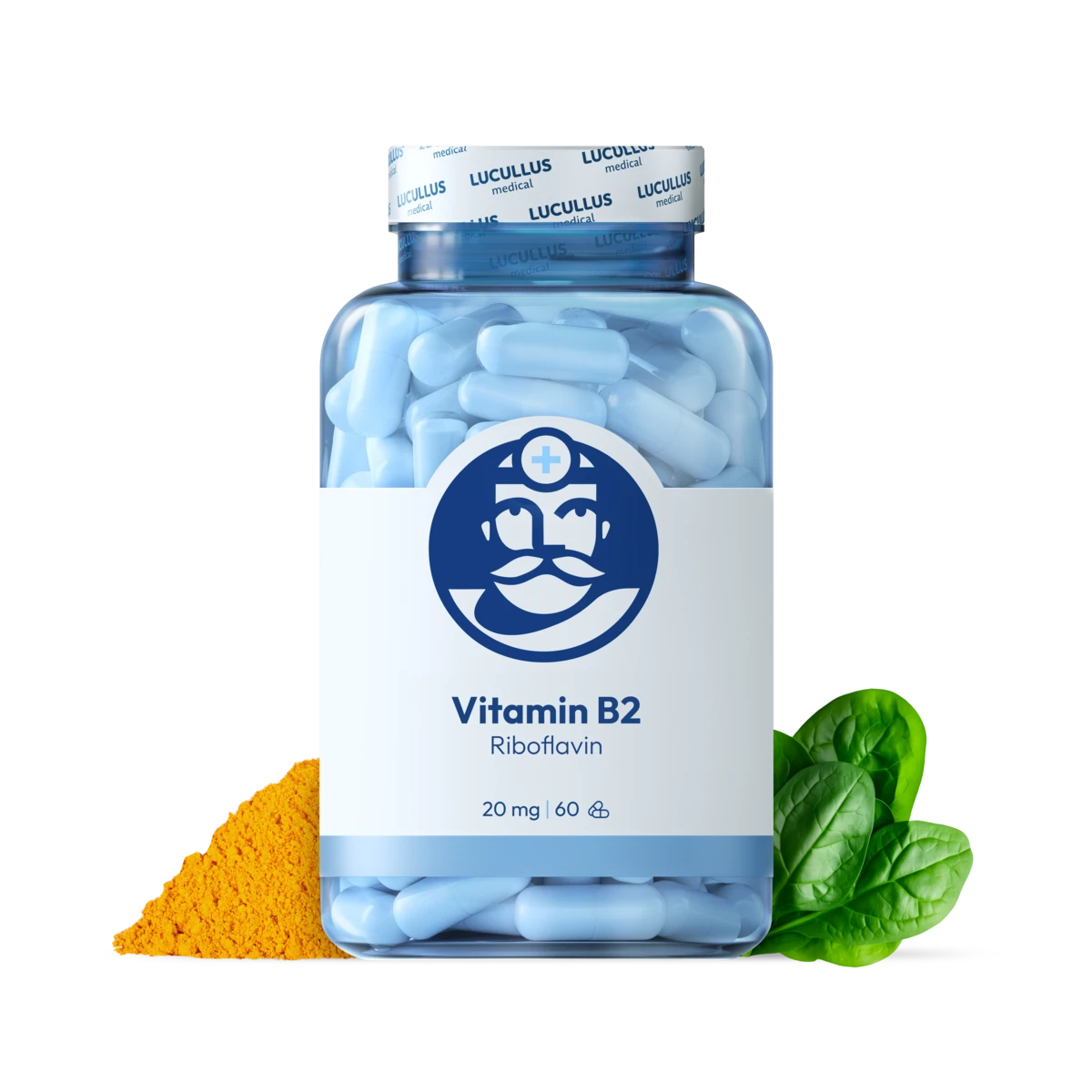
Účinky
Optimisation of the digestive processSupport for intolerancesRelief of indigestionPromoting intestinal tract healthSuperior bioavailability
Pack of 60 capsules
| Active ingredient | In daily dose | % Ref |
|---|---|---|
| Vitamin B2 (riboflavin) | 20 mg | 1428.57% |
Ingredients: Vitamin B2 (riboflavin), bulking agent: magnesium carbonate, microcrystalline cellulose, capsule made from gelatin.

Read the latest news about quality dietary supplements, vitamins, immunity, and health.

Určite poznáte pocit, keď sa cítite v ohrození. Vybehol na vás spoza plota veľký pes, na porade sa na vás oboril šéf a zniesol vás pod zem, alebo je zajtra splátka hypotéky a vy ste práve dostali padáka z práce. V takýchto prípadoch telo produkuje steroidný hormón - kortizol. Ten nás už chráni v nebezpečných situáciách a telo pripravuje pozície "bojuj, alebo uteč". Srdce sa rozpumpuje, krv sa nahrnie do dôležitých orgánov, hladina bolesti potláča... Poviete si - najužitočnejšia vec pod slnkom!

V starom filme je scéna, kde babka alebo dedko nútia každé ráno malé deti vypiť lyžičku rybieho oleja. Deti to nenávidia, chutí to odporne. „Ale budeš zdravý!“- znie veta starostlivých starkých. Odkiaľ sa toto vzalo? , platí dodnes, akurát veda dokázala zázračný rybí tuk premeniť na "obyčajné" tablety, alebo extrakty s normálnou nie sú chuťou.

“Is it just another vitamin... or?” one might think, but the more we learn about pantothenic acid, the more it fascinates us. Vitamin B5 plays a crucial role in converting food into energy, supports concentration, mental well-being, and even skin regeneration. Without it, the body would not be able to properly produce hormones or fight stress. It is also a substance that is hidden in every cell of our body, accompanies us from birth, and contributes to sufficient energy, skin health, and mental acuity. Although we may overlook it, its importance is undeniable, and its name is no coincidence. It comes from the Greek word “panto”, meaning “everywhere.” And indeed, it is omnipresent, irreplaceable, and somewhat mysterious. If we start exploring where this essential vitamin is found, it's in eggs, nuts, whole grains, shellfish, avocados, salmon, liver, kidneys, beef, yeast, vegetables... And if we've just realized that our diet is low in these foods, we should consider supplementing B5. After just a few days, we would notice a change. We would wake up with more energy, have a clearer mind, and even see an improvement in our skin. Colleagues would notice that we work faster, are more creative, and less stressed. Pantothenic acid will help us get back in shape. And for us, it will no longer be just another substance on the list of vitamins.

Vitamín B3 - niacín, možno aj starší poznajú aj pod názvom P. Patrí do skupiny vitamínov B, ktoré nájdeme v multiformnom B-komplexe. Je to veľmi dôležitá skupina, ktorú potrebujete pre správnu funkciu zraku, slizníc, kože, srdca... V prípade potreby potrebujete pre správne fungovanie srdcovej, svalovej a nervovej činnosti.

V naturálnom doplnku je ukrytá menej známa rastlina diskórea huňatá ( Discorea villosa, Wild yam) z čeľade Dioscoreaceae. Poďme sa s ňou zoznámiť ☺ Existuje viac ako 600 druhov rastlín yam, najvýraznejší druh je divoký yam (Dioscorea villosa). Táto trvá nenáročná liana (vinič) rovníkových oblastí, má listy v tvare srdca. V listoch a koreňoch je prítomný diosgenín (primárna zložka), práve koreň sa používa v medicíne aj v našich doplnkoch, ako koncentrovaný extrakt (najvyššia výťažnosť), štruktúra je podobný cholesterol. Táto látka sa používala na výrobu prvých antikoncepčných podkladov.

Okrem doplnkov, fungovaniu a rôznych suplementov, potrebuje naše telo ku 100% aj tzv. stopové látky. Označenie "stopové" znamená, že ho naše telo potrebuje iba v malom objeme. Zinku potrebujeme 10mg denne, čo je oproti horčíku (375mg) 37x menšie množstvo. Zdalo by sa, že sa bavíme o úplnej zbytočnosti. Opak je však pravdou. Zinok ovplyvňuje viac ako 200 biochemických reakcií v našom tele!